Wikipedia:Picture of the day/December 2016
|
Featured picture tools: |
These featured pictures, as scheduled below, appeared as the picture of the day (POTD) on the English Wikipedia's Main Page in December 2016. Individual sections for each day on this page can be linked to with the day number as the anchor name (e.g. [[Wikipedia:Picture of the day/December 2016#1]] for December 1).
You can add an automatically updating POTD template to your user page using {{Pic of the day}} (version with blurb) or {{POTD}} (version without blurb). For instructions on how to make custom POTD layouts, see Wikipedia:Picture of the day.
December 1
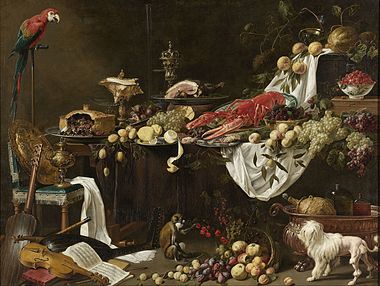
|
Banquet Still Life, a 1644 oil-on-canvas painting by the Flemish artist Adriaen van Utrecht (1599–1652). Van Utrecht, born in Antwerp, studied under Herman de Neyt before going on a tour of France, Germany and Italy. He focused predominantly on banquet still lifes, showing banquets, game and fruit, garlands, or flowers, as well as market and kitchen scenes. Painting: Adriaen van Utrecht
Recently featured:
|
December 2

|
A man in a newsagent's shop in Paris, France. Such shops are typically located in busy public places and sell newspapers, magazines, cigarettes, snacks and often items of local interest. These shops may be either freestanding kiosks or part of a larger structure. Photograph: Florian Plag
Recently featured:
|
December 3

|
The courtyard at the Sultan Ahmed Mosque in Istanbul, Turkey. Popularly known as the Blue Mosque for the hand-painted blue tiles that adorn the mosque’s interior walls, it was constructed between 1609 and 1616 during the rule of Ahmed I. The mosque's Külliye contains Ahmed's tomb, as well as a madrasah and a hospice. Photograph: Benh Lieu Song
Recently featured:
|
December 4
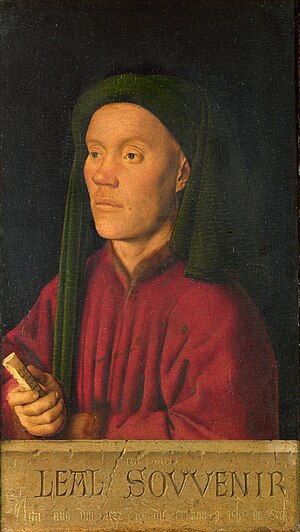
|
Léal Souvenir is a small 1432 oil-on-oak panel portrait by the Early Netherlandish painter Jan van Eyck. This painting commemorates an unidentified man, possibly Timotheus of Miletus, who is considered "plain and rustic" yet also thoughtful and inward-looking. The painting is held at the National Gallery, London. Painting: Jan van Eyck
Recently featured:
|
December 5
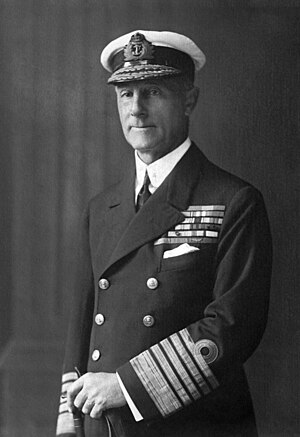
|
John Jellicoe (1859–1935) was a Royal Navy officer who fought in the Anglo-Egyptian War and Boxer Rebellion and commanded the Grand Fleet at the Battle of Jutland during the First World War. His handling of the fleet at that battle was controversial: he made no serious mistakes and the German High Seas Fleet retreated to port – at a time when defeat would have been catastrophic for Britain – but the British public was disappointed that the Royal Navy had not won a victory on the scale of the Battle of Trafalgar. Jellicoe later served as First Sea Lord, overseeing the expansion of the Naval Staff at the Admiralty and the introduction of convoys, but was removed at the end of 1917. He also served as the Governor-General of New Zealand in the early 1920s. Photograph: Bain News Service; restored by Adam Cuerden
Recently featured:
|
December 6
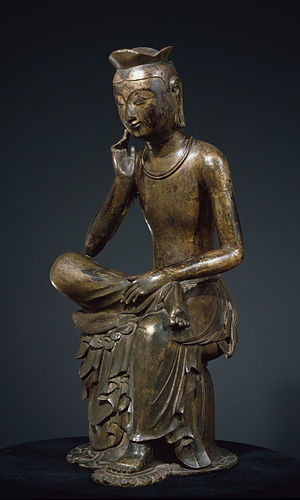
|
The Gilt-bronze Maitreya in Meditation is a gilt-bronze statue of what is believed to be the Maitreya, the future Buddha, in a semi-seated contemplative pose. The statue, which is thought to come from Silla, is 93.5 centimetres (36.8 in) in height. It is considered one of the finest Buddhist sculptures ever produced and now housed at the National Museum of Korea. Insured for an estimated 50 billion won, the statue is also the most expensive National Treasure of Korea. Photograph: National Museum of Korea
Recently featured:
|
December 7
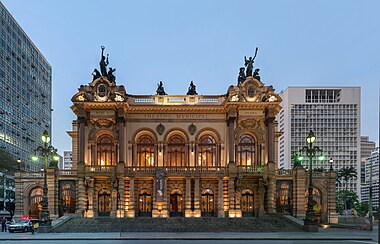
|
The Municipal Theatre of São Paulo is a theatre and landmark in São Paulo, Brazil. It is significant both for its architectural value as well as its historical importance; the theatre was the venue for the Modern Art Week in 1922, which revolutionised the arts in Brazil. The building now houses the São Paulo Municipal Symphonic Orchestra, the Coral Lírico (Lyric Choir), and the City Ballet of São Paulo. Photograph: The Photographer |
December 8

|
Still Life: Vase with Pink Roses is an oil painting on canvas completed in 1890 by Vincent van Gogh in Saint-Rémy. At the time the work was painted, Van Gogh was readying himself to leave the Saint-Rémy asylum for the quiet town of Auvers-sur-Oise outside of Paris. The painting reflects the optimism Van Gogh felt at that time about his future, both in his choice of flowers as a subject and the colors used. The painting is owned by the National Gallery of Art of Washington, D.C. Painting: Vincent van Gogh |
December 9

|
Grace Hopper (1906–1992) was an American computer scientist and United States Navy Rear Admiral. She was one of the first programmers of the Harvard Mark I computer in 1944, invented the first compiler for a computer programming language, and helped popularize the idea of machine-independent programming languages. This led to the development of COBOL, one of the first high-level programming languages. In recognition of Hopper's contributions, the destroyer USS Hopper is named for her, as is the Cray XE6 "Hopper" supercomputer at NERSC. Photograph: James S. Davis |
December 10

|
Pulteney Bridge is an arch bridge that crosses the River Avon in Bath, England. Designed by Robert Adam and completed by 1774, it connects Bath with the Georgian town of Bathwick. The Grade I listed building has shops built across its full 45-metre (148 ft) span. Photograph: Diego Delso
Recently featured:
|
December 11

|
A mass grave of 26 Republican victims killed by Nationalists in 1936 during the Spanish Civil War. This grave was excavated in Estépar, Burgos, in 2014. Generally speaking, mass graves contain multiple bodies that may or may not be identified prior to burial. They may be seen after violent conflict or be dug for sanitation reasons after a major famine, epidemic, or natural disaster. Photograph: Mario Modesto Mata
Recently featured:
|
December 12

|
Lars Kruse (1828–1894) was a fisherman from Skagen in the far north of Jutland, Denmark, who was credited with saving over 200 lives. In one case, on 27 December 1862, he rescued much of the crew of the Swedish brig Daphne when it was stranded during a storm. Kruse also gained fame through his portraits, painted by Michael Ancher, and an account of his mistreatment written by Holger Drachmann in a mixture of poems and prose. Painting: Michael Ancher
Recently featured:
|
December 13

|
The European robin (Erithacus rubecula) is a small insectivorous passerine bird in the Old World flycatcher family. Around 12.5–14.0 cm (5.0–5.5 in) in length, the male and female are similar in colouration, with an orange breast and face lined with grey, brown upperparts and a whitish belly. It is found across Europe, east to Western Siberia and south to North Africa; it is sedentary in most of its range except the far north. Photograph: Francis C. Franklin
Recently featured:
|
December 14

|
A student of Sanata Dharma University's Balinese dance troupe Sekar Jepun performing the condong dance. This type of dance, which is often performed as a preface to legong and accompanied by the semar pangulingan style of gamelan, uses simplified legong movements to depict a palace servant. Photograph: Chris Woodrich
Recently featured:
|
December 15
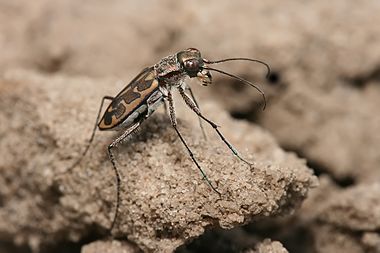
|
Tiger beetles are a large group of beetles known for their aggressive predatory habits and running speed. The fastest species of tiger beetle can run at a speed of 9 km/h (5.6 mph), or about 125 body lengths per second. As of 2005, about 2,600 species and subspecies are known, with the richest diversity in the Indomalayan realm, followed by the Neotropics. Photograph: Muhammad Mahdi Karim
Recently featured:
|
December 16
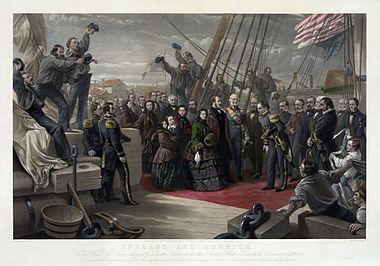
|
Queen Victoria visits HMS Resolute prior to the ship being granted to her as a gift. Resolute was a British ship abandoned in the Arctic ice in 1854. She was found adrift by American whalers the following year, refurbished, and returned to the British. As a return favour, when the ship was broken up in 1879, some of its wood was made into a desk and gifted to the US President Rutherford B. Hayes. The Resolute desk remains an iconic part of the American White House furniture. Lithograph: George Zobel, after William Simpson; restoration: Adam Cuerden
Recently featured:
|
December 17
Subpage 1

|
The nave at St Paul's Cathedral, an Anglican cathedral that sits on Ludgate Hill at the highest point of the City of London. The seat of the Bishop of London and the mother church of the Diocese of London, the present church dates from the late 17th century and was designed in the English Baroque style by Sir Christopher Wren. It was the tallest building in London from 1710 to 1967 and remains the second-largest church building in area in the United Kingdom, after Liverpool Cathedral. Photograph: David Iliff
Recently featured:
|
Subpage 2

|
The choir at St Paul's Cathedral, an Anglican cathedral that sits on Ludgate Hill at the highest point of the City of London. The seat of the Bishop of London and the mother church of the Diocese of London, the present church dates from the late 17th century and was designed in the English Baroque style by Sir Christopher Wren. It was the tallest building in London from 1710 to 1967 and remains the second-largest church building in area in the United Kingdom, after Liverpool Cathedral. Photograph: David Iliff
Recently featured:
|
Subpage 3

|
The choir at St Paul's Cathedral, an Anglican cathedral that sits on Ludgate Hill at the highest point of the City of London. The seat of the Bishop of London and the mother church of the Diocese of London, the present church dates from the late 17th century and was designed in the English Baroque style by Sir Christopher Wren. It was the tallest building in London from 1710 to 1967 and remains the second-largest church building in area in the United Kingdom, after Liverpool Cathedral. Photograph: David Iliff
Recently featured:
|
Subpage 4

|
The high altar at St Paul's Cathedral, an Anglican cathedral that sits on Ludgate Hill at the highest point of the City of London. The seat of the Bishop of London and the mother church of the Diocese of London, the present church dates from the late 17th century and was designed in the English Baroque style by Sir Christopher Wren. It was the tallest building in London from 1710 to 1967 and remains the second-largest church building in area in the United Kingdom, after Liverpool Cathedral. Photograph: David Iliff
Recently featured:
|
Subpage 5

|
The dome at St Paul's Cathedral, an Anglican cathedral that sits on Ludgate Hill at the highest point of the City of London. The seat of the Bishop of London and the mother church of the Diocese of London, the present church dates from the late 17th century and was designed in the English Baroque style by Sir Christopher Wren. It was the tallest building in London from 1710 to 1967 and remains the second-largest church building in area in the United Kingdom, after Liverpool Cathedral. Photograph: David Iliff
Recently featured:
|
Subpage 6

|
The Chapel of St Michael & St George at St Paul's Cathedral, an Anglican cathedral that sits on Ludgate Hill at the highest point of the City of London. The seat of the Bishop of London and the mother church of the Diocese of London, the present church dates from the late 17th century and was designed in the English Baroque style by Sir Christopher Wren. It was the tallest building in London from 1710 to 1967 and remains the second-largest church building in area in the United Kingdom, after Liverpool Cathedral. Photograph: David Iliff
Recently featured:
|
December 18

|
|
The Lambert cylindrical equal-area projection is a cylindrical equal-area projection used in cartography. Attributed to the Swiss mathematician Johann Heinrich Lambert, this projection is undistorted along the equator, which is its standard parallel. Distortion increases rapidly, however, towards the poles, which become lines instead of points. Map: Strebe, using Geocart
Recently featured:
|
December 19
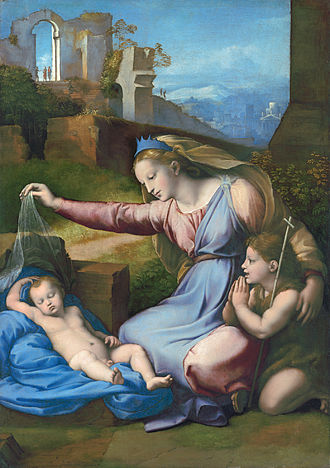
|
Madonna with the Blue Diadem is an oil painting on wood by Raphael and his pupil Gianfrancesco Penni that is held at the Louvre. Most likely completed in Rome in the 1510s, the painting features Mary symbolically lifting a veil over the sleeping Christ Child; Raphael had used the same theme in his Madonna of Loreto. Painting: Raphael and Gianfrancesco Penni
Recently featured:
|
December 20

|
|
The Theodor Heuss Bridge is an arch bridge over the Rhine River connecting Wiesbaden and Mainz. Spanning 102.94 meters (337.7 ft), it is named after German statesman Theodor Heuss and was built in the late 1940s. Photograph: Arcalino |
December 21

|
|
A panoramic view of the gravel pit near Kongensbro, Denmark, which is operated by BG Stone. Gravel pits are open-pit mines for extraction of gravel and often lie in river valleys where the water table is high. As such, pits may naturally fill with water, and abandoned ones are often used as nature reserves or as amenity areas for water sports, landfills and walking. Photograph: Slaunger; edit: David Iliff |
December 22

|
Thor, in Norse mythology, is a hammer-wielding god associated with thunder, lightning, storms, oak trees, strength, the protection of mankind, and also hallowing and fertility. He is prominently mentioned throughout the recorded history of the Germanic peoples and is described as relentlessly slaughtering his foes and having fierce battles with the monstrous serpent Jörmungandr. Symbols of Thor were worn in defiance during the Christianization of Scandinavia, and today his influence is found in the names of cities and a day of the week as well as popular culture. He is shown here in Thor's Fight with the Giants, an 1872 painting by Mårten Eskil Winge which depicts the deity in battle with a jötunn. Painting: Mårten Eskil Winge
Recently featured:
|
December 23

|
Nuremberg is a census-designated place in Schuylkill and Luzerne counties, Pennsylvania, United States. The population was 434 at the 2010 census. It occupies a total area of 0.58 square miles (1.5 km2). Photograph: Jakec
Recently featured:
|
December 24

|
The long-billed curlew (Numenius americanus) is a large North American shorebird of the family Scolopacidae. The species breeds in the grasslands in west-central North America, migrating south and towards the coast in winter. It feeds predominantly on crabs and various other small invertebrates. Photograph: Frank Schulenburg
Recently featured:
|
December 25

|
The Adoration of the Shepherds is a common subject in the Nativity of Jesus in art. The scene, based on the Biblical account in Luke 2, depicts shepherds as near witnesses to the birth of Jesus in Bethlehem, arriving soon after the actual birth. It is often combined in art with the Adoration of the Magi, in which case it is typically just referred to by the latter title. The example here comes from 17th-century Ukraine and is currently held at the Ivan Honchar Museum. Painting: Unknown
Recently featured:
|
December 26

|
A dancer from Sanata Dharma University's Sekar Jepun troupe performing the baris tunggal dance. The baris family of Balinese war dances is accompanied by gamelan and performed by one or more men, sometimes wielding a variety of weapons. The dance has been understood to depict the feelings of a young warrior prior to battle, glorify the manhood of the triumphant Balinese warrior, and display the sublimity of his commanding presence. Photograph: Chris Woodrich
Recently featured:
|
December 27

|
Charles Hodge (1797–1878) was a Presbyterian theologian and principal of Princeton Theological Seminary between 1851 and 1878. He was a leading exponent of the Princeton theology, an orthodox Calvinist theological tradition in America during the 19th century. He argued strongly for the authority of the Bible as the Word of God. Many of his ideas were adopted in the 20th century by Fundamentalists and Evangelicals. Painting: Rembrandt Peale
Recently featured:
|
December 28

|
Sorrow is a drawing by Vincent van Gogh produced in 1882, two years after Van Gogh decided to become an artist. It is one of numerous works which use Clasina Maria Hoornik—here depicted as a 32-year-old pregnant woman—as a model. Van Gogh appears to have thought highly of the drawing and considered it "the best figure I've drawn". The drawing is part of the Garman Ryan Collection held at The New Art Gallery Walsall. Drawing: Vincent van Gogh
Recently featured:
|
December 29

|
Koi feeding at the United States National Arboretum in Washington, D.C. Koi are ornamental varieties of domesticated common carp (Cyprinus carpio) that are kept for decorative purposes in outdoor koi ponds or water gardens. Varieties are distinguished by coloration, patterning, and scalation. Some major colors are white, black, red, yellow, blue, and cream. Photograph: Arden
Recently featured:
|
December 30
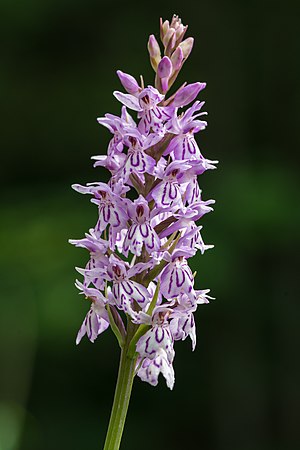
|
Dactylorhiza fuchsii is a common species of orchid found in much of Europe, with the range extending eastward into Siberia, Mongolia and Xinjiang. It is widely variable in colour, and it ranges from 15 to 60 cm in height. This specimen was photographed near Mariazell, Austria. Photograph: Uoaei1
Recently featured:
|
December 31

|
St. Michael Vanquishing Satan is an oil painting by the Italian High Renaissance artist Raphael which depicts the archangel Michael slaying Satan. Originally a panel painting at the behest of Pope Leo X, the work was transferred to canvas and now hangs in the Louvre. Painting: Raphael
Recently featured:
|
Picture of the day archives and future dates
